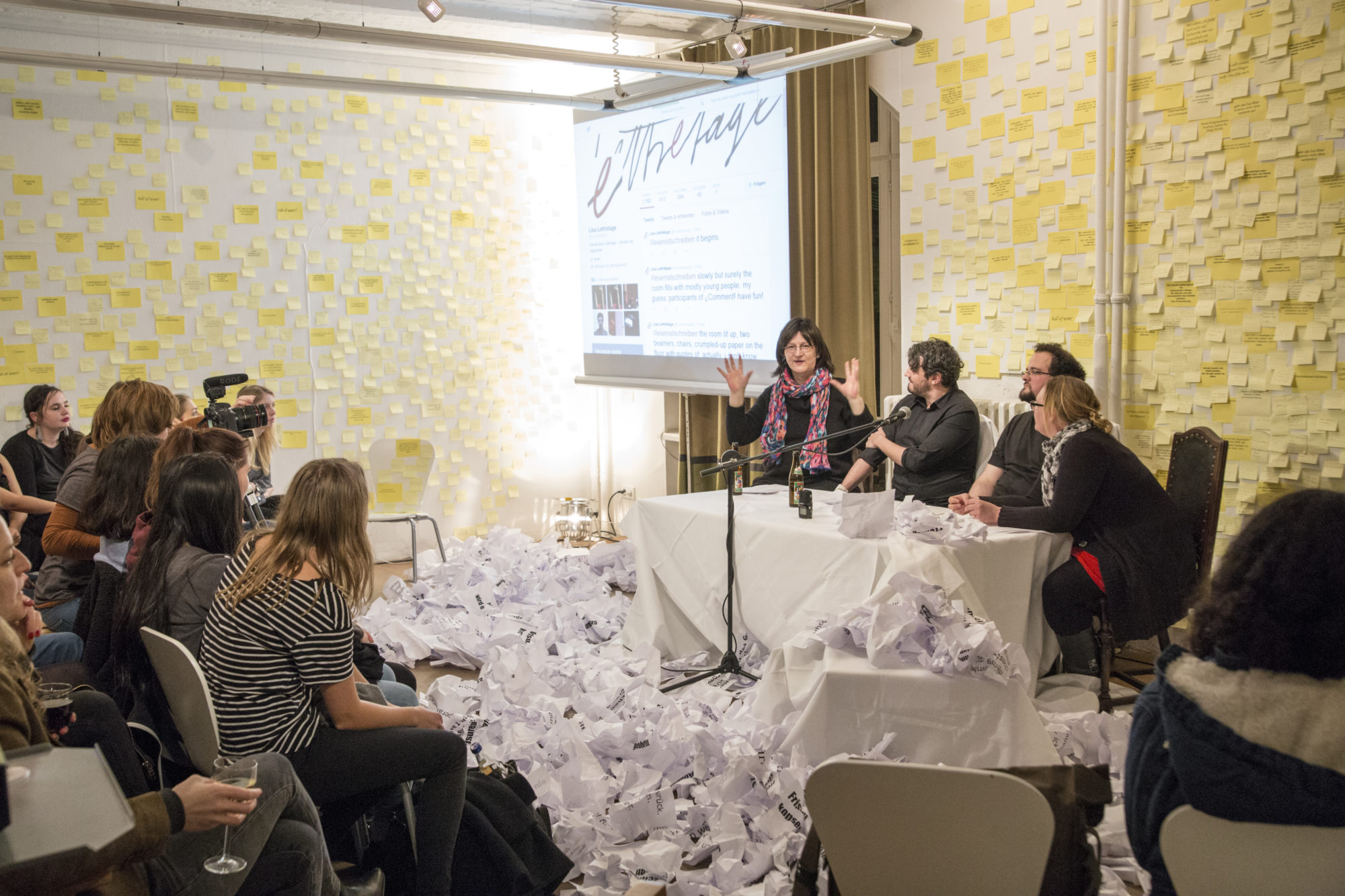Seit 2006 finden in der Lettrétage ca. 120 öffentliche Literaturveranstaltungen jährlich statt – Lesungen, Workshops, Diskussionsrunden, literarische Performances und Formate dazwischen. Bekannte und unbekannte Autor*innen und Künstler*innen verschiedener Sprachen und Nationalitäten sind hier schon aufgetreten.
Seit 2013 liegt der Programmfokus u.a. auf neuen Wegen der literarischen Präsentation und Live-Produktion: Dazu zählen u.a. die internationalen bzw. transnationalen Literaturfestivals „Soundout!“, „¿Comment!“, „Berlinisi“ und „Syn_Energy“, aber auch das viel beachtete Netzwerkprojekt „CROWD“ und multimediale Projekte wie die Reihe „CON_TEXT“ oder das „Poetry Audio Lab“. Eine vollständige Liste der Lettrétage-Projekte finden Sie hier.
Als Ankerinstitution für die freie Literaturszene Berlins stellt die Lettrétage außerdem ihre Räume für Literaturveranstaltungen aller Art zur Verfügung. Zahlreiche freie Veranstalter*innen nutzen unsere Infrastruktur regelmäßig – für Literatur-Workshops, Lesereihen in verschiedenen Sprachen und Buchpräsentationen. Mehr zu den Möglichkeiten der kostenlosen Raumnutzung erfahren Sie hier.
Auf dieser Seite präsentieren wir einen nicht vollständigen Einblick in unser vergangenes Programm.
Veranstaltungen
Termin Informationen:
-
Do07Sep202320:00Eintritt: frei
Playing words – A musical evening featuring the voices of contemporary poets interpreted through composition and live electronics.
Sound installation artist and composer, Paul Brody, creates live compositions in dialogue with the voices of recorded poets.

(c) Paul Brody The music is created from samples of orchestral sounds, prepared piano, environmental noise, percussion derived from toys and kitchen utensils, and more. The selected poets are Marica Bodrožić, Orsolya Kalász, Uljana Wolf, Tom Bresemann, Dmitri Strozew, Marina Frenk.
While one poet might inspire a funky groove composed from recordings of twisting tin cans, footsteps, and a drumbeat ripped from an old Deutsche Grammophon LP, another writer’s voice might conjure up an electro-symphonic collage. The foundation of the concert is writers reading their works, but Brody also improvises with cuts of consonants, stretching vowels, or creating rhythmic patterns from fricatives to paint a heretofore unexplored musical landscape.
The idea of translating a poem from its sonic qualities isn’t new. Two poets in this installation, Uljana Wolf and Christian Hawley, have worked with homophonic translation—renderings of poems based on their sonic qualities rather than the meaning of the words.
The show features stories dedicated to place and neighborhood, in this second leg of Brody’s four-part cycle “Love & Democracy,” notions that are inextricably intertwined. Without a love of place and neighbors, democracy is impossible. And without treating each other fairly—democratically—there can be no real love. As the German jurist and politician Lore Maria Peschel-Gutzei says, “Democracy is the most difficult form of government. One must care enough to struggle and respect and negotiate.” The same could be said for love.
Paul Brody-piano, trumpet, trombone, sampler percussion, sampling
Rachel Susser-flute
Verena Vehling-Viola d'amore Marie
Renault-Violin
Jan Schade-cello
Jan Roede-bassMore information and audio samples on Paul Brody's website.
 (c) Dirk Hasskarl
(c) Dirk HasskarlPaul Brody was born in the USA, California, and received his training as a musician at the New England Conservatory of Music in Boston. Brody works regularly as a sound artist, composer and trumpeter at the Théâtre de Vidy in Lausanne, the Munich Kammerspiele, the Berlin Schaubühne, the MC93 Paris, the New York Harlem Opera and the Vienna Burgtheater, among others. A close collaboration connects him with the music producer John Zorn. His album "Hinter allen Worten", which features artists such as Clueso, Meret Becker or Jelena Kulijic, was on the best list of the Preis der deutschen Schallplattenkritik. Paul Brody was nominated for the Europe Broadcasting Festival and the International Feature Festival Vienna for his work as a sound artist. His sound art works have been heard on WDR, Deutschlandradio, the Jewish Museum Berlin, MuseumsQuartier Vienna, and Transmediale Berlin. He is currently writing an opera for the Opéra National de Lorraine in Nancy. A close collaboration connects him with the theater directors David Marton and Hans-Werner Kroesinger.
The sound installation combines texts in German and English.
The elevator in the building is currently not operational. We apologize for this issue, as it restricts access to some extent.
Workshops & Infoabende
Termin Informationen:
-
Mo20Aug201819:00Eintritt frei
Berliner Lektorat: Show, don't tell
Zeig mir was – „show don't tell“ im fiktionalen Schreiben, Veranstaltung der Gruppe Berliner Lektorat mit Karla Schmidt und Lisa Kuppler

© Lisa Kuppler „Zeig es mir, behaupte es nicht“ bekommen Autoren*innen immer wieder von ihren Lektor*innen zu hören. Was auf Englisch mit „show don't tell“ bezeichnet wird, ist einer der Hauptgrundsätze des literarischen Schreibens heute. Zeig mir das Gefühl, das Problem, die Motivation, den Ort – die Leser*innen möchte etwas „sehen“ (riechen, schmecken, fühlen, hören), wenn sie Texte lesen. Wenn Romane stattdessen behaupten und erklären, was Leser*innen selbst erleben möchten, werden sie als bevormundend und langweilig empfunden.
An diesem Abend erläutern Lisa Kuppler und Karla Schmidt an vielen Textbeispielen den Unterschied zwischen „Zeigen“ und „Behaupten“. Sie stellen vor, wie man etwas elegant vermitteln kann, das auf den ersten Blick nicht „gezeigt“ werden kann, wie z.B. Musik, Erotik oder Unterbewusstes. Und es wird es auch darum geht, wann es sinnvoll ist, zu behaupten und gerade nicht zu zeigen.
Wer eine kurze Textpassage (höchstens 10 Zeilen) einreichen möchte, kann diese bis zum 17. August an lisa.kuppler@krimilektorat.de mailen. Im Textausschnitt soll es um ein Beispiel von „zeigen nicht behaupten“ gehen. Es werden zwei Texte zur Besprechung ausgewählt.

© Karla Schmidt Karla Schmidt lebt mit ihrer Familie in Berlin und ist freiberufliche Lektorin / Entwicklungslektorin. Für die „Schule des Schreibens" hat sie den Lehrgang „Romanwerkstatt" konzipiert. Nebenberuflich schreibt sie Romane und Erzählungen, die in kleinen und großen Verlagen erscheinen. Mehr Infos auf ihrer Homepage.

© Lisa Kuppler Lisa Kuppler arbeitet seit 20 Jahren als freie Lektorin mit Schwerpunkt Genreliteratur. Sie unterrichtet Creative Writing (Nordkolleg Rendsburg, Bücherfrauen eAkademie) und coacht Autor*innen. In ihrer Freizeit schreibt sie Fanfiction. Mehr Infos hier.
Weitere Veranstaltungen des Berliner Lektorats im dritten Quartal 2018:
18. September 2018: „Kürzen oder Längen" mit Susanne Zeyse (lektorat-zeyse.de/)
17. Oktober 2018: „Schreiben in Perspektive" mit Lisa Kuppler (krimilektorat.de/lisa221b)
Facebook: facebook.com/berlinerlektorat/
